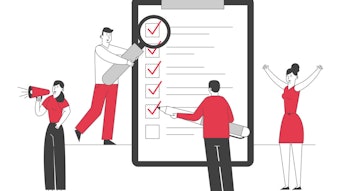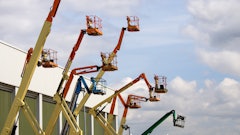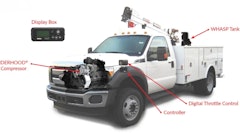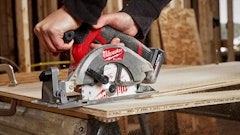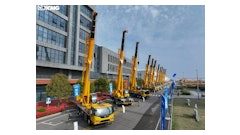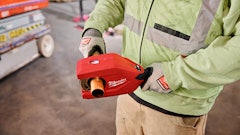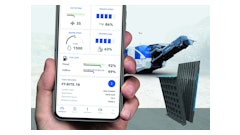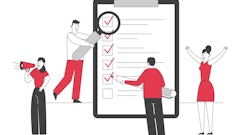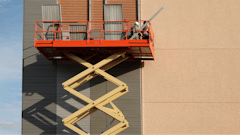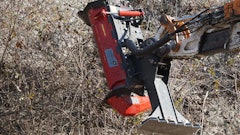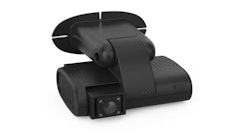
"Do it right the first time" is one of the primary professional goals that owner Rick Dahl promotes in the workplace at Metrolift, an independent rental house serving the Chicago area with lift equipment since 1991. From his commitment to his employees and customers, to safety, and even his diligent approach to complying with government regulations, it's apparent Dahl believes in doing the right thing, and he doesn't cut corners. In this day and age, it can be tough to succeed with such a conscientious business philosophy, but the company has seen it pay off with dividends.
Midwestern roots
Born and raised around Eau Claire, WI, Rick Dahl got his first taste of equipment from his family. His father was a union equipment operator and two of his uncles owned excavating companies. After college, Dahl worked in sales, eventually going to work for the Chicago-area rental operation Timesavers in 1986. This ultimately led him to start Metrolift in 1991 as a wholesale operation, buying and selling aerial equipment around the country. Only a year later, economic conditions suddenly had Dahl with an inventory of equipment on his hands, so he began renting on a wholesale level out of a location in Elmhurst, IL. Success grew out of that, ultimately requiring the company to move to its current headquarters in the western Chicago suburb of Sugar Grove, IL. When the move took place in 2002, Metrolift owned 288 pieces of equipment. Today, the company is home to a total of 1,300 units and 45 employees.
Building a brand
Metrolift serves the entire Chicagoland area up to southern Wisconsin, over to northwest Indiana and out to the Mississippi to the west. The company gets 75 percent of its business from commercial contractors and 25 percent from industrial customers. Not so long ago, only 5 percent of the business went to the industrial segment, but this market has been actively cultivated by Dahl's right-hand woman, Jacki Valdez, who heads up sales on the industrial side. She says Metrolift's success in growing its industrial base has stemmed mostly from a serious and active commitment to company branding.
"We haven't had to do a lot of prospecting because we've done so much marketing," she explains. "We really have created a brand."
Building awareness of the Metrolift identity has resulted from simple things like designing a colorful, recognizable and upscale logo and then promoting it with decals on every piece of equipment. "We have a consistsent look that's visually appealing and it's really helped," says Valdez.
Growing the fleet
Going from 288 pieces of equipment in 2002 to 1,300 today reflects a tremendous growth spurt, considering the expansion continued despite the most serious economic downturn in the history of the rental industry. "We were growing by leaps and bounds through October 2008, and then we saw things fall off the table; revenues dropped 40 percent," Dahl recalls. "At that point, we had to make some tough decisions, but we were financially in a good position to withstand the storm. We actually had months and years during the downturn where we were profitable."
He adds, "We still bought equipment in 2008 and '09 - we never stopped buying new."
Of the 1,300 pieces of equipment in the Metrolift fleet, 25 percent are booms (Genie and Skyjack), 70 percent are scissors (Skyjack) and roughly 5 percent are telehandlers (JLG SkyTrak and Genie).
Dahl says he believes in keeping his fleet tuned to industry metrics such as average fleet age and utilization. And lately, this has meant making significant capital expenditures. To that end, Tony Moore, CFO, says the company purchased $4 million worth of new and used equipment in 2011 and has already placed $2 million in orders so far this year, with plans to make a similar overall investment in equipment by year end, particularly in the area of telehandlers.
Moore also notes that rental revenues for the company, which boasts an annual sales volume of $15 million last year, were up 23 percent in 2011 from the previous year and the trend promises to continue. "We had our high in 2008," says Moore, "and we're optimistic we can get there again this year."
A company light on its feet
One of the reasons Metrolift was able to stay profitable during a down economy is due to management's ability to be flexible in the face of market changes. Dahl is the first to admit he would have done some things differently if he could, but in the long run, the ability to anticipate market needs and roll with the changes is what counts. For example, when the residental housing market in Chicago dried up a couple of years ago, a lot of 6,000-pound telehandlers just sat in the yard at Metrolift. "So we sold a lot of ours to Canada," Dahl says. "Looking back, I probably would not have done that because suddenly, the telehandler business has gotten really, really busy again. So our decision to reduce our fleet was probably not the best idea. But now we're back to looking forward and increasing our telehandler fleet."
Of course, being flexible has required making some tough decisions too. "In 2008, we did make some cuts and we had to let some people go," Dahl says. "We looked into how we could reduce our expenses and we got ahead of that storm, whereas some of our competitors were very challenged financially."
He continues, "We just felt that if we stick with the core values we have (see inset box), even when times get tough, we can weather those storms and come ouf of them hopefully in a position to take advantage of some opportunities."
Three-point focus
Dahl and the employees of Metrolift pride themselves on providing value-added equipment. With that in mind, they focus on three important points: on-time delivery, on-time service and repair, and correct billing.
Any one of the three points can present a multitude of challenges for a rental business, but it boils down to being responsive. Dahl says, "When there's a problem, we find a solution and turn it around quickly. We don't let it fester."
For example, Dahl and his staff understand that downtime is expensive for contractors. "If equipment breaks, we try to be there within two hours, and in Chicago, to be anywhere in two hours is a challenge."
To manage those logistics, the company uses iPhones and Fleetmatics to coordinate drivers, mechanics and sales people so customers can always get a solution in the event equipment breaks down. "If there is a problem, we handle it immediately. That's one of the realities in a contractor's world: you can't get the time back if a machine is broken."
Another way Metrolift works to reduce customer downtime is by diligently maintaining equipment and keeping fleet age on par with industry metrics, such as the Rouse Construction Rental Report. Also, to ensure equipment is in top condition and serviced promptly, the company employs five full-time road service mechanics as well as two full-time inside mechanics whose entire focus is to quality check all machines before they go out on rent.
Correct billing is also an area of vital importance. Metrolift ensures customers are charged accurately by post-billing invoices. "We strive for zero mistakes in billing," Dahl says. "We make sure to do it right the first time. And if, for some reason, it isn't right the first time, we get it right the second time - quickly."
Safety - a primary initiative
A member of the board of directors for the International Powered Access Federation, Dahl holds a strong belief in making safety a priority. This is evidenced by the fact that all employees have gone through one formal safety training program or another. And while that's an impressive fact by itself, perhaps most notable is that Metrolift employs a full-time safety director. "Not many independents have a safety director," Dahl says, adding, "Safety is a huge initiative for us. Anybody can say they're safe, but executing a safety strategy is a whole different deal."
Metrolift executes its safety strategy through daily staff meetings. Every morning at 8 a.m., Dahl gathers all employees to go over what needs to be done that day, how it's going to get accomplished, as well as any safety concerns. Following that, he meets specifically with all of the mechanics.
Effective training and an ongoing dialogue about safety are vital to a safe workplace, but according to Dahl, it's necessary to have someone dedicated to the cause in order to make a safety strategy really work. "You need to have a safety pillar," he says. "All of our customers have safety protocols and safety people. The vendor now needs to have that, and that's a shift in our industry. United Rentals and some of the larger nationals have regional safety personnel. Now, from an independent standpoint, I don't know how we could operate without someone dedicated full time to safety."
Adding value
Difficult to quantify, safety has an immeasurable value when one factors in what's at stake. Valdez explains that Metrolift promotes safety to customers through a variety of means, including offering annual inspections, as required by OSHA regulations. She says many contractors don't know about the annual inspection requirement for aerial work platforms, so Metrolift works to educate end users on why the inspection is needed and the potential consequences of not getting it.
In addition, Metrolift makes a point of distributing IPAF's Statement of Best Practices of General Training and Familiarization for Aerial Work Platform Equipment to its customers to bring attention to what's required. "Awareness is huge," Valdez says. "We send it out to new customers and drop it off with general contractors. We want to make sure we're giving our customers what they actually need, not just what they think they need."
Discipline is key
The rental industry is currently experiencing a period of expansive growth, but one of the biggest challenges is the rapidly accelerating price of commodities and new equipment, and the relationship these costs have to rental rates. "If you were to tell me six months ago that equipment prices would be up 10 to 15 percent today, I would have said no way, but it's happening," Dahl says.
As a result of the increase, Metrolift has had to raise its rental rates 10 percent across all product lines, even when some of its competitors are cutting theirs. "We're customer-focused and value-added, and we're not the cheapest in the marketplace," Dahl says. "We feel we offer a safe product, we have customer service, we respond quickly. We don't feel the market should be taken by price."
He continues, "We want to focus on our core values, our direction, our strategy. We don't want to be naive to our competition, but we're not going to change our plan based on some of the undisciplined actions in the marketplace. So, we're saying no more often. There was a time when it was very difficult for any independent or national to say no to certain opportunities, but we've increased our 'nos' tremendously."
It's always tough to increase rates, and the challenge is particularly difficult in the face of new equipment costs that are increasing steeply due in part to upcoming Tier IV engine regulations. "The costs that are getting presented to us just to have that engine change could be as high as $6,000 per machine," Dahl says, noting that compliance issues are one of the biggest sources of anxiety when running his business.
"Just to be in compliance with EPA, DOT, ANSI, etc., when you're an independent rental company, you have to have full-time awareness," he says. "We want to do the right thing, so we're assigning people here to monitor that full time. When we need to make adjustments based on a new interpretation or new laws that come out every year, we want to be the first to acknowledge that and make those changes. But it's a challenge."
Secrets to success
Despite the challenges, Metrolift is poised for continued success. "We're planning our growth to be 10 percent this year," Dahl says. "We got out of the gate at 20 percent, so for us, that's a huge win, but we still have many more months."
Dahl makes no bones about the fact he attributes his success largely to his faith and that of his employees' as well. In fact, his faith and his relationship with his employees go hand in hand. "We try to treat each other like we'd want to be treated. When you're on this team, there are high expectations, but we treat each other with respect," Dahl says. "That's critical because during tough times, us coming together as a family meant a lot. We have our challenges, but as a leader it's a huge benefit when you have people out in front of you that are just fantastic."
As far as a vision goes, Dahl says he's focused on a couple of areas. "We're going to be the best communicator with our customers, with each other, and with our vendors," he says.
Valdez explains this is achieved by making themselves available, for starters. "We have somebody who can pick up the phone 24 hours a day, seven days a week, 365 days a year. It's important for us to make sure customers feel important all the time. We constantly give them the opportunity to communicate with us."
Valdez adds that Dahl is always accessible to customers, something she says is unique at their level and which speaks volumes about the company's philosophy about being responsive and doing the right thing. "I'm a better sargeant than a general," Dahl says. "I believe it's important for me to be in the game, so we can stay ahead of it."





